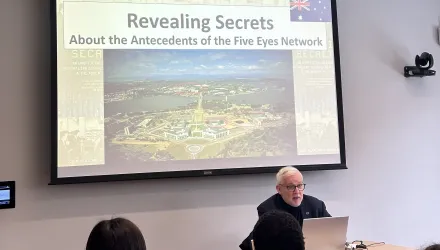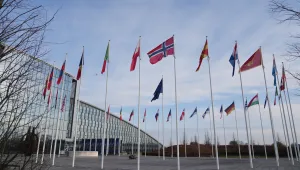On Thursday February 3, at the Harvard Kennedy School, North African specialist Dr. Hugh Roberts spoke to students, faculty and members of the community about the complexity and causes of rioting in Algeria in January.
Roberts put forward a comparative analysis of Algeria’s riots and the recent unrest in Tunisia, outlining different motivations and trends in the seemingly similar uprisings.
The protests in Tunisia, he said, have been centripetal, moving from the western and southwestern periphery of the country towards the capital. And so the social forces behind the demonstrations there rapidly involved the middle class and the trade unions and so came to express their discontent with President Zine El Abidine Ben Ali.
In Algeria, the protests began at the core, in the capital, Algiers, and quickly spread to Ouahran, and then out to other cities. Algeria’s protests were led by angry unemployed urban youth, who are alienated by what they call “la hogra”, that is, the contempt with which they feel they are treated by the state, and who see only a future of despair. He added that rioting has been a significant feature of Algerian political life in the last four to five years, and has been largely devoid of specific political demands.
Myriad media outlets asserted that the principal cause of Algerian riots was a steep rise in food prices. Roberts challenged this, explaining that that the riots in Ouahran were not food riots and had involved attacks on private property, middle class citizens, and the police. Rather than protesting against food prices, the rioters had been denouncing what they called “la mal vie” – the “dog’s life” they feel they are living. Algerian youths’ needs are not being met, culminating in nihilistic behavior and unrest, iterated Roberts
The regime, he said, needs to address the different social interests but has found it hard to do so because it has not allowed these to be clearly articulated. The purely formal pluralism that was introduced has failed to provide real political representation, and a large portion of the population has become alienated from the political process as a result. It is this failure of representation that has led to the “endemic rioting” as a necessary aspect of current political life in Algeria.
Elements of the Algerian intelligentsia have now begun to respond to the failings of the political system that the riots have revealed by coordinating a new citizen network calling for the repeal of the State of Emergency, which has been in effect since 1992. The Algerian League for the Defense of Human Rights’ (LADDH) has been taking the lead in this effort, working to form new coalition of democratic pressure groups and organizing a national day of action on February 12th to call for the State of Emergency’s repeal. But the State of Emergency is not the only problem. Sooner or later, Algeria’s democrats will need to address the more fundamental causes of Algeria’s political malaise.
Maalouf, Michelle Lee. “Dr. Hugh Roberts on the recent unrest in Algeria, in light of Tunisia and Egypt.” February 10, 2011


